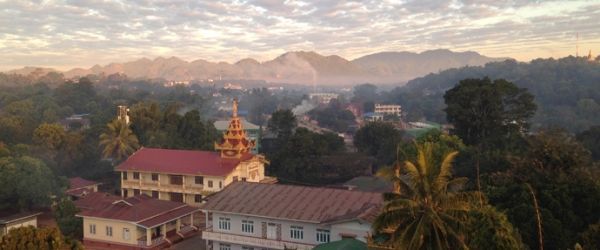
Suffering before Christ and for Christ
As the dark day when we remember Christ’s death approaches, suffering may be on our minds. Perhaps we recall the words of Paul, “That I may know him and the power of his resurrection, and may share his sufferings
, becoming like him in his death, that by any means possible I may attain the resurrection from the dead.” ( Philippians 3:10-11
 ) In many places on our planet, sharing Christ’s sufferings comes naturally, as belief in him brings ostracism, mocking, abandonment from family and friends.
) In many places on our planet, sharing Christ’s sufferings comes naturally, as belief in him brings ostracism, mocking, abandonment from family and friends.
That’s certainly the case for the Shan people, with whom we’ve been working in Thailand. And we’ve seen amazing progress! But the Shan aren’t originally from Thailand, so one of our workers in that country went on a search to understand their roots and what leads them to accept the cost of discipleship.
* * *
By Doug H. in Thailand — A door finally opened for me to visit a far-away kingdom that is off the beaten track. This is the heartland of the Shan people; the place where they have lived for centuries. Until recently, no Westerners could live in the frontier city pictured above. But even here, the good news of great joy is penetrating a dark world. We had to not only get government visas to visit this country, but also gain permission from local militias to visit “off-road” villages. Once we did, we travelled by motorcycle down winding dirt roads to meet some fascinating Shan Christ-followers. Let me share just three things I discovered:
1. There are very few Shan Christians (less than 1%), in a world dominated by Buddhist temples and spirit houses. We asked them what it will take to see their people come to Christ. Their answer: Suffering . They have found that when their people are in crisis and have nowhere else to turn, they become open to the gospel.
2. We asked them what it costs for a Shan to come to Christ. Their answer: Land . Over and over I heard stories of Shan who were forced out of their villages when they chose to identify with Christ. Their ancestral lands are everything for them, because they depend on harvests of corn, rice and sugar cane to survive. Is it any wonder Jesus said that, to be his disciples, we must be ready to forsake mother, father, homes and fields? That is most often the price the Shan must pay.
3. I also asked what the of role of the missionary should be today. What I heard surprised me. “The day is long gone when the white face is the one leading us to Christ.” Those who are best able to lead them to Christ are believers from their own culture or closely related cultures. Our role today is to come alongside small Shan churches; to love them, pray with them, and assist them in bringing the gospel to the many villages with no gospel witness.
These are the kind of harvesters I’m asking God to bring to Thailand from North America, Europe and Asia: Young millennials who will learn the local languages fluently and humbly come to love the local church and assist believers in reaching their own people. Could that be you?
The path to missions can feel overwhelming! Our experienced mission coaches will walk alongside you every step of the way.

• Find out how you can become a SEND missionary.
• Explore where and how you can serve with SEND.
• Subscribe to On Mission , our free monthly newsletter full of inspiration, ideas, and encouragement for people interested in becoming cross-cultural missionaries.
Additional Posts




